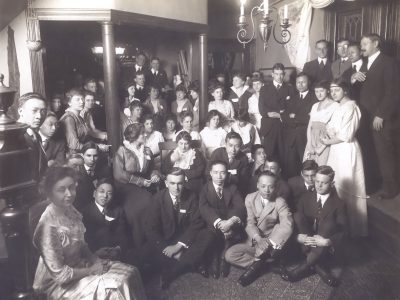The history of global engagement at the University of Pennsylvanian in the twentieth century is a huge topic. Not only were offices, centers and associations created to make Penn more affluent in the international arena, but the attitudes of Americans to the world and foreigners to the United States drastically changed over the course of the years, oftentimes due to respective nations’ institutional and political policies. The twentieth century saw two world wars, foreign conflicts such as those in Korea and Vietnam, the rise of communism, the domination of the superpowers in reality and ideology, economic crises and finally, a path to the first years of the twenty-first century in which the world is learning to deal with increased globalization in a post-9/11 world.
This paper was researched and written in the course of a ten-week summer fellowship at the University Archives and Research Center (UARC) of the University of Pennsylvania. Due to time constraints and the sheer size of the topic, it was necessary to focus on only a few pieces of the history of global engagement and glance over others. The choice areas of focus are those that the author feels are of primary importance to the understanding of this topic: the history of the Office of International Programs, the history of International House with the Penn community, Penn’s past relations with other countries and regions, its involvement with international crises and general patterns and trends relating to foreign students throughout the years. There was simply no time to give a more thorough analysis of other topics of importance, such as student and alumni organizations, regional centers, etc. Many of these topics will be mentioned in passing in this report, but many will also be left out. There was no discretionary policy used to decide which ones to include and which not to – rather, these topics are used more as an example to show some larger picture.
It is the hope that this preliminary work on the history of global engagement at the University of Pennsylvania leads to more interest in the subject, and that others will elaborate and continue the work to create a more comprehensive story. And it is the hope that those topics that only got a mere glance or those left out in this report become projects of their own. Only through more work of this nature, can a view of the past global engagement at the University of Pennsylvania be more fully explained, and the work of the future more solidly based.
Finally, the author wishes to thank some key people who helped and guided her along with the course of this project. First and foremost, to the University Archives and Records Center, without which the opportunity to even do this project would not have occurred and especially to the careful guidance of Mark Lloyd, Director of the Archives, Mary McConaghy and Nancy Miller. Secondly, thanks must go to the Office of International Programs, for allowing the author access to past annual reports and personal files, without which this overview would not have been nearly as complete as it is with thanks to the guidance of Julienne Gherardi and Elva E. Power. Lastly, thanks must also go the International House of Philadelphia, with special thanks to Carole Parker, Director of Building Services in Building Operations and Simone Jeffers, Development Associate at the Office of Institutional Advancement.

